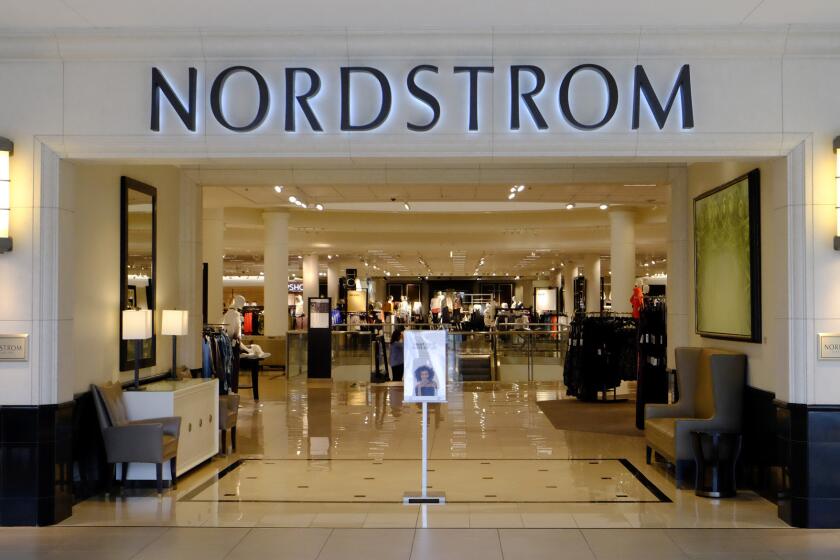Big stores took a hit as shoppers spent over the holidays, but not in malls

- Share via
Grim news continues to roll in for mall-based retailers, with several companies reporting declines in a key sales metric over the holiday period despite a broader rise in consumer spending.
Kohl’s Corp., J.C. Penney Co. and L Brands Inc. all reported drops in same-store sales, which is a critical measure of retail success. Macy’s Inc. also reported a drop in comparable sales on Wednesday, although it noted improving trends, while Bed Bath & Beyond withdrew its financial projections amid weak results.
The holidays are the most important time of year for most retailers, so hopes for a sustained turnaround for beleaguered companies in large part hinged on a better performance in the final months of 2019. But deeply ingrained trends — such as digital-savvy shoppers migrating to wherever the discounts are, forcing prices down across the market — are preventing many retailers from regaining their former stature.
Jaime Webb loves buying clothes online. And returning clothes she buys online.
The declines at Kohl’s and L Brands in particular were surprising, said Poonam Goyal, an analyst with Bloomberg Intelligence.
“Sales should have been up, but they weren’t and that’s a bit concerning,” Goyal said. “They could have posted better results, and the fact that they didn’t shows the need for them to drive traffic and maybe even shrink their stores into smaller formats. It’s time to do more.”
The biggest retailers — especially Amazon.com Inc., Walmart Inc. and Target Corp. — are among the primary beneficiaries of the mall-based troubles. E-commerce gobbled up market share during the holidays, with web sales in the U.S. growing almost 19% compared with last year, according to Mastercard SpendingPulse data, which tracked sales from Nov. 1 to Dec. 24.
All signs pointed to confident U.S. consumers who were ready to open their wallets. Spending picked up in November and income gains topped projections, according to Commerce Department data released in December. This makes the sales declines at the traditional retailers more stark, according to Alex Arnold, a managing director of the consumer practice at investment bank Odeon Capital.
“You’re just seeing this ongoing transformation of retail,” he said. “The consumer is still engaged, which is good, but you have to be positioned for the market. It’s not about opening a bunch of stores. It’s about making investments in being competitive digitally.”
Here’s a look at some of the details the companies released on Thursday.
Kohl’s
Kohl’s reported a same-store sales decline of 0.2% in November and December. The company also said profit for fiscal 2019, which ends in February, will be at the low end of its previously announced range of $4.75 to $4.95 a share.
Chief Executive Officer Michelle Gass said strength in e-commerce, beauty, footwear and other areas was offset by weakness in women’s apparel, and said the company is working “with speed” to fix the problem. Kohl’s shares fell as much as 9.7% on Thursday and closed down 6.5% at $46.15.
The Woodland Hills grocery store will be different from Amazon’s Whole Foods stores but won’t use the high-tech Amazon Go checkout system.
“Although the sales dip at Kohl’s is only modest, it is disappointing that the company was not able to continue the growth posted during the third quarter,” Neil Saunders, managing director of GlobalData Retail, said in emailed comments. “This is especially so as the consumer economy was strong over the period, so the flat performance is more reflective of Kohl’s and its strategy rather than of external dynamics.”
The company had stressed the importance of promotions and partnerships, like serving as a drop-off point for Amazon returns, in attracting customers over the holiday period.
L Brands
The owner of Victoria’s Secret also posted negative results, a sign its efforts to shift its marketing approach haven’t been enough. L Brands has struggled to adjust to a broader change in the lingerie business, with competitors gaining traction by embracing different body types while Victoria’s Secret continued to drive its push-up bra aesthetic.
Same-store sales dropped 12% for Victoria’s Secret, and L Brands cut its earnings forecast for the fourth quarter to about $1.85 a share, down from a previous projection of about $2. Investors shrugged off the results, however, with L Brands stock closing up 4.5% at $18.96.
J.C. Penney
The Dallas-based department-store chain, which has been fighting to reverse falling foot traffic and improve its inventory management, reported that same-store sales fell 5.3% in the holiday period when excluding the impact of its exit from the appliance and furniture categories.
J.C. Penney reaffirmed its forecast for a full-year adjusted comparable-store sales decline of 5% to 6%. The company is scheduled to report earnings on Feb. 27. The shares fell as much as 13% and finished down 10.8% at $1.07.
While e-commerce is growing in relevance, stores remain an important factor, Bob Phibbs, head of the Retail Doctor, a New York-based consulting firm, said.
The results at J.C. Penney and Kohl’s suggest 2020 could be another difficult year for department stores, which were the worst-performing sector on the S&P 500 Index in 2019.
Right now, their main challenge is luring shoppers away from more niche options like Lululemon Athletica Inc., according to Phibbs.
“In 2020, it’s all about knowing who your customer is, becoming a niche player and knowing how to deliver,” he said.
More to Read
Inside the business of entertainment
The Wide Shot brings you news, analysis and insights on everything from streaming wars to production — and what it all means for the future.
You may occasionally receive promotional content from the Los Angeles Times.











